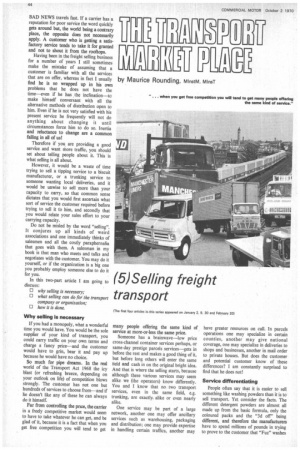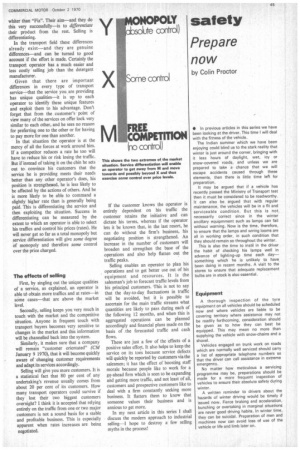by Maurice Rounding, MInstM, MInsT
Page 46

Page 47

If you've noticed an error in this article please click here to report it so we can fix it.
BAD NEWS travels fast. If a carrier has a reputation for poor service the word quickly gets around but, the world being a contrary place, the opposite does not necessarily apply. A customer who is getting a satisfactory service tends to take it for granted and not to shout it from the rooftops.
Having been in the freight selling business for a number of years I still sometimes make the mistake of assuming that a customer is familiar with all the services that are on offer, whereas in fact I usually find he is so wrapped up in his own problems that he does not have the time--even if he has the inclination—to make himself conversant with all the alternative methods of distribution open to him. Even if he is not very satisfied with his present service he frequently will not do anything about changing it until circumstances force him to do so. Inertia and reluctance to change are a common failing in all of us!
Therefore if you are providing a good service and want more traffic, you should set about telling people about it. This is what selling is all about.
However, it would be a waste of time trying to sell a tipping service to a biscuit manufacturer, or a trunking service to someone wanting local • deliveries, and it would be unwise to sell more than your capacity to carry, so that common sense dictates that you would first ascertain what sort of service the customer required before trying to sell it to him, and secondly that you would relate your sales effort to your carrying capacity.
Do not be misled by the word "selling". It conjures up all kinds of weird associations and one immediately thinks of salesmen and all the costly paraphernalia that goes with them. A salesman in my book is that man who meets and talks and negotiates with the customer. You may do it yourself, or if the organization is a big one you probably employ someone else to do it for you.
In this two-part article I am going to discuss:
El why selling is necessary; o what selling can do for the transport company or organization; El how it is done.
Why selling is necessary If you had a monopoly, what a wonderful time you would have. You would be the sole supplier of your kind of transport, you could carry traffic on your own terms and charge a fancy price—and the customer would have to grin, bear it and pay up because he would have no choice.
So much for pipe dreams. In the real world of the Transport Act 1968 the icy blast (or refreshing breeze, depending on your outlook on life) of competition blows strongly. The customer has not one but hundreds of services to choose from—and if he doesn't like any of these he can always do it himself.
Far from controlling the price, the carrier in a freely competitive market would seem to have to take whatever he can get, and be glad of it, because it is a fact that when you get free competition you will tend to get many people offering the same kind of service at more-or-less the same price.
Someone has a brainwave—low price cross-channel container services perhaps, or same-day prestige parcels services—gets in before the rest and makes a good thing of it, but before long others will enter the same field and cash in on the original bright idea. And that is where the selling starts, because although these various services may seem alike we (the operators) know differently. You and I know that no two transport services, even in the same field, e.g. trunking, are exactly, alike or even nearly alike.
One service may be part of a large network, another one may offer ancillary services such as warehousing, packaging and distribution; one may provide expertise in handling certain traffics, another may have greater resources on call. In parcels operations one may specialize in certain counties, another may give national coverage, one may specialize in deliveries to shops and businesses, another in mail order to private houses. But does the customer and potential customer know of these differences? I am constantly surprised to find that he does not!
Service differentiating People often say that it is easier to sell something like washing powders than it is to sell transport. Yet consider the facts. The different detergent powders are almost all made up from the basic formula, only the coloured packs and the "3d off" being different, and therefore the manufacturers have to spend millions of pounds in trying to prove to the customer that "Fuz" washes
whiter than "Fiz". Their aiin—and they do this very successfully—is to differentiate their product from the rest. Selling is differentiating.
In the transport field these differences already exist—and they are genuine differences—and can be turned to good account if the effort is made. Certainly the transport operator has a much easier and less costly selling job than the detergent manufacturer.
Given that there are important differences in every type of transport service—that the service you are providing has unique qualities—it is up to each operator to identify these unique features and exploit them to his advantage. Don't forget that from the customer's • point of view many of the services on offer look very similar to each other, and he sees no reason for preferring one to the other or for having to pay more for one than another.
In that situation the operator is at the mercy of all the forces at work around him. If a competitor reduces a rate he too will have to reduce his or risk losing the traffic. But if instead of taking it on the chin he sets out to convince his customers that the service he is providing meets their needs better than any other operator's does, his position is strengthened, he is less likely to be affected by the actions of others. And he is more likely to be able to command a slightly higher rate than is generally being paid. This is differentiating the service and then exploiting the situation. Success In differentiating can be measured by the extent to which an operator is able to select his traffics and control his prices (rates). He will never get so far as a total monopoly but service differentiation will give some degree of monopoly and therefore some control over the price charged.
The effects of selling
First, by singling out the unique qualities of a service, as explained, an operator is able td obtain more traffics and at rates—in some cases—that are above the market level.
Secondly, selling keeps you very much in touch with the market and the competitive situation. Anyone in frequent touch with transport buyers becomes very sensitive to changes in the market and this information will be channelled back into the system. Similarly, it makes sure that a company will remain "customer orientated" (CM January 9 1970), that it will become quickly aware of changing customer requirements and adapt its services accordingly.
Selling will give you more customers. It is a statistical fact that 80 per cent of any undertaking's revenue usually comes from about 20 per cent of its customers. How many transport operators could survive if they lost their two biggest customers overnight? I think it is accepted that relying entirely on the traffic from one or two major customers is not a sound basis for a stable and profitable business. This is especially apparent when rates increases are being negotiated. If the customer knows the operator is entirely dependent on his traffic the customer retains the initiative and can dictate his terms, whereas if the operator lets it be known that, in the last resort, he can do without the firm's business, his negotiating position is strengthened. An increase in the number of customers will broaden and strengthen the base of the operations and also help flatten out the traffic peaks.
Selling enables an operator to plan his operations and to get better use out of his equipment and resources. It is the salesman's job to forecast traffic levels from his principal customers. This is not to say that the day-to-day fluctuations in traffic will be avoided, but it is possible to ascertain for the main traffic streams what quantities are likely to pass during each of the following 12 months, and when this is aggregated operations can be planned accordingly and financial plans made on the basis of . the forecasted traffic and cash flows.
These are just a few of the effects of a positive sales effort. It also helps to keep the service on its toes because service defects will quickly be reported by customers via the salesmen; it has the effect of boosting staff morale because people like to work for a g9-ahead firm which is seen to be expanding and getting more traffic, and not least of all, customers and prospective customers like to deal with a firm constantly seeking more business. It flatters them to know that someone values their business and is anxious to get more.
In my next article in this series I shall discuss the modern approach to industrial selling—I hope to destroy a few selling myths in the process!












































































































